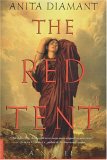Summary | Excerpt | Reading Guide | Reviews | Readalikes | Genres & Themes | Author Bio

Jacob arrived late in the afternoon in the week of a full moon, ate a simple meal of barley bread and olives, and fell into an exhausted sleep that lasted through most of the next day. Leah was mortified by the simplicity of the food they had offered him at first, so the next day she set out to produce a feast seen only at the great festivals.
"I suffered over that meal like nothing else I had ever cooked," said Leah, telling me the story during dull, hot afternoons while we rocked the narrow-necked jars, straining the water from goat curd.
"The father of my children was in the house, I was sure of it. I could see he was smitten by Rachel, whose beauty I saw as if for the first time. Still, he looked at me without flinching, and so I hoped.
"I slaughtered a kid, an unblemished male, as though it were a sacrifice to the gods. I beat the millet until it was as soft as a cloud. I reached deep into the pouches where I kept my most precious spices and used the last of my dried pomegranate. I pounded, chopped, and scraped in a frenzy, believing that he would understand what I was offering him.
"Nobody helped me with the cooking, not that I would have permitted anyone else to touch the lamb or the bread, or even the barley water. I wouldn't let my own mother pour water into a pot," she said and giggled.
I loved this story and asked to hear it again and again. Leah was always reliable and deliberate, and far too steady to be giddy. And yet as she recounted her first meal for Jacob, she was a foolish, weepy girl.
"I was an idiot," she said. "I burned the first bread and burst into tears. I even sacrificed a bit of the next loaf so that Jacob might fancy me. Just as we do when we bake the cakes for the Queen of Heaven on the seventh day, I broke off a piece of dough, kissed it, and offered it to the fire as an offering of hope that the man would claim me.
"Don't ever tell Zilpah about this or I'll never hear the end of it," said Leah, in a mock-conspiratorial whisper. "And of course, if Laban, your grandfather, had any idea of how much food I put together for a beggar who showed up without so much as a jug of oil as a gift, he would have flogged me. But I gave the old man enough strong beer that he made no comment.
"Or maybe he made no mention of my extravagance because he knew he'd be lucky with this kinsman. Maybe he guessed he had discovered a son-in-law who would require little by way of a dowry. It was hard to know what the old man knew or didn't know. He was like an ox, your grandfather."
"Like a post," I said.
"Like a cooking stone," said my mother.
"Like a goat turd," I said.
My mother shook her finger at me as though I were a naughty child, but then she laughed out loud, for raking Laban over the coals was great sport among his daughters.
I can still recite her menu. Lamb flavored with coriander, marinated in sour goat milk and a pomegranate sauce for dipping. Two kinds of bread: flat barley and raised wheat. Quince compote, and figs stewed with mulberries, fresh dates. Olives, of course. And to drink, a choice of sweet wine, three different beers, and barley water.
Jacob was so exhausted he nearly missed the meal that Leah brought forth with so much passion. Zilpah had a terrible time waking him and finally had to pour water on his neck, which startled him so badly that he swung out with his arms and knocked her to the ground, where she hissed like a cat.
Zilpah was not at all happy about this Jacob. She could see that his presence had changed things between the sisters and would weaken her bond to Leah. He offended her because he was so much more attractive than the other men they saw, foul-mouthed shepherds and the occasional trader who looked at the sisters as though they were a pack of ewes.
Jacob was well spoken and fair of face. And when he met Leah's gaze, Zilpah understood that their lives would never be the same. She was heartsick and angry and helpless to stop the change, though she tried.
Copyright Anita Diamant 1997. All rights reserved. Reprinted with the permission of the publisher, St Martin's Press.




The worth of a book is to be measured by what you can carry away from it.
Click Here to find out who said this, as well as discovering other famous literary quotes!
Your guide toexceptional books
BookBrowse seeks out and recommends the best in contemporary fiction and nonfiction—books that not only engage and entertain but also deepen our understanding of ourselves and the world around us.